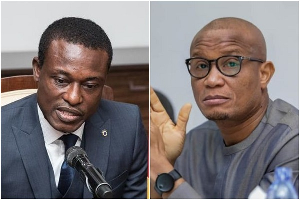From 1957 up to February 241966 was the most exciting period in the history of our country.
We had broken loose the chains of bondage and colonialism. Our political leaders at the time were full of confidence and were determined to make Ghana a shinning example for the rest of Africa.
Such was our optimism that we defiantly proclaimed to the rest of the world that the independence of Ghana was meaningless without the total liberation of the whole of Africa. There was money in the national coffers and we were willing to share it with our “brothers” in Guinea Conakry, Mali and in other African countries.
Our generosity was appreciated as we sought to accelerate the de-colonisation process. For example, it was believed that Guinea Conakry and Mali were each given ten million pounds sterling to pursue their post-colonial agenda.
Dr. Nkrumah’s CPP government at the time was fired up by imagination and initiated a string of development projects across the country, from the Akosombo hydroelectric power project to the development of import substitution manufacturing industries.
The Ghanaian landscape was dotted with many development projects. However nobody thought of how these could be sustained.
We sought to create wealth through public sector ownership and did everything possible to discourage private enterprise. In no time, we had dissipated the savings we inherited from our colonial masters and sought to sustain our development efforts through borrowing. It was a recipe for disaster.
The emerging economic crisis and the rapidly deteriorating political environment eventually led to the overthrow of the CPP government through a military coup d’etat.
Some political commentators have blamed the demise of Nkrumah’s government on the cold war. In his book, "In Search of Enemies- A CIA Story", John Stockwell pointed out how the United States took advantage of the internal weaknesses of the CPP government and encouraged dissidents to plot against it.
However, Nkrumah’s government’s determination to build a monolithic state greatly contributed to its downfall. They failed to recognise the fact that ours was and still is a multi-ethnic society, which required a flexible political model for political expression and individual enterprise.
For instance, it was na?ve for anyone to have thought that they could subjugate the Asante through the imposition of a one party state. The Asantes had fought hard against British imperialism and there was no way they would have submitted themselves to an authoritarian rule.
Even today there are still some politicians in the country who overlook this fundamental fact! We seem to have lost our way since the glorious 1960s. Our pride has been dealt a severe blow. Our confidence has been sapped. We have had our "liberators", "redemptionists" and pseudo socialists/nationalists, promising economic nirvana.
These were mere political gimmicks that fooled only the credulous segment of the population. These so called leaders were charlatans who merely engaged in rent-seeking behaviour.
They took the politics of self-preservation to dizzying heights as they fed from the public trough with abandon. Our material circumstance has not changed in a substantial way. The 2002 Human Development Index ranks Ghana in the 129th position out of 173 countries! This is totally unacceptable.
As a country we only excel in producing skilled manpower for other countries. We have become economic nomads and believe that anywhere else is better than our own country!
Without the generosity of our development partners, who contribute between 40-45 percent of the total money required for our national development, we would have sunk so low: Roads would not have been built, our health facilities would have collapsed, there would not be a road network, etc.
And yet we live in a century of endless possibilities and opportunities. There are rapid advances in technology, exemplified by the internet revolution; there is market liberalisation and so on. Sadly, we seem not well organised enough to take advantage of what the world offers like the Asians in China, India, Malaysia, South Korea, etc. are doing.
A great number of politicians are surprisingly unimaginative and have stayed clear of fashioning a common vision for a prosperous Ghana.
Our political debates must be shaped by what kind of society we want to live in and set about to devise strategies to achieve it.
This is what should concentrate the minds of our politicians and every citizen and not petty political squabbles that characterise our current political discourse.
We must develop a shared vision that will have the support of all to propel us to achieve our potential as a nation and to stop us from abandoning our country in droves.















